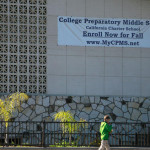Civil lawsuits are as much a part of America’s charter school landscape as blackboards and parental ire, and the 5th U.S. Circuit Court of Appeals in New Orleans is one of the latest battlegrounds. At issue is the Greater Grace Charter Academy a bit west of New Orleans that is 93 percent black enrollment, but where the population is only 62 percent black, according to the Associated Press.
In a report posted on the NOLA news website, the AP says that “… Louisiana’s education board approved the school’s charter and U.S. District Judge Martin Feldman allowed the opening last August. He noted the school has a non-discriminatory enrollment policy. He said blocking the opening would punish students who chose to enroll there. Opponents argue that approving a nearly one-race school ‘is contrary to the goals of desegregation.'”
Arguments are expected to be heard this month. Read the AP report here:
Charter school segregation lawsuit goes to U.S. appeals court

